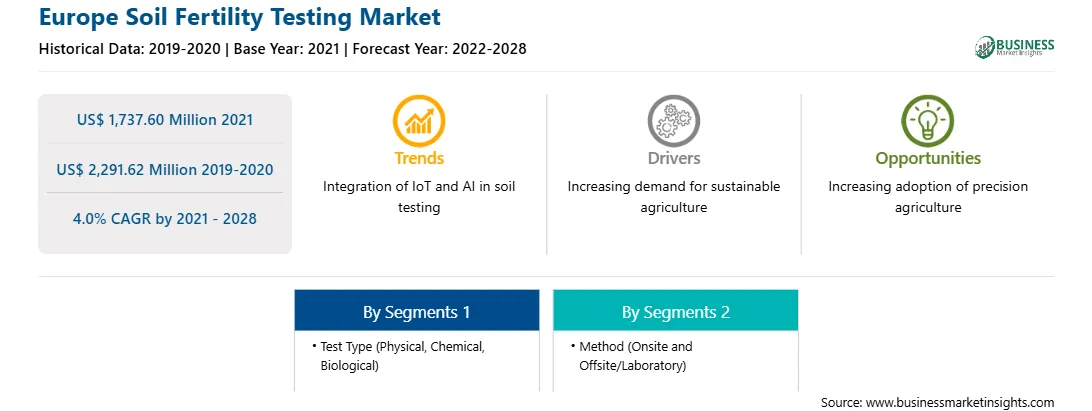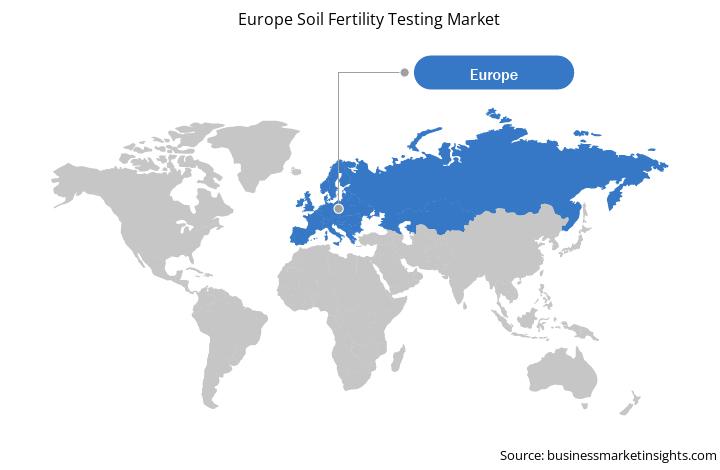The soil fertility testing market in Europe is further segmented into Germany, France, Italy, the UK, Russia, and Rest of Europe. In European Union (EU) countries, water erosion that causes a loss of one-meter depth of soil every year is a major concern. The increase in population and urbanization is highlighting the requirement of greater land area for food production. According to a report published by United Nations in 2018, 20% of the earth is not producing food as before. This problem is affecting 5% of European land as well as another 10% of land is under severe stress. Therefore, various regulations and policies have been formed in the EU for soil protection as well as for soil quality improvement. The thermatic Strategy for Soil Protection focuses on key threats to soil in the EU, including erosion, floods and landslides, organic matter loss, salinization, contamination, compaction, sealing, and soil biodiversity loss. The Common Agriculture Policy (CAP), and Environment Impact Assessment Directive are among such regulatory policies. The CAP regulation becomes an important economic driver for farming decisions across EU, alongside protecting the soil health through its implementation by the member states and land manager’s. The CAP framework helps bring improvements in soil quality along with protecting its health. According to CAP, the farmers must comply with good agricultural and environmental conditions (GAECs). The GAEC requirement mandates farmers to use the farm sustainability tools (FaST) for developing their nutrient management plans. The tool includes information such as soil data, soil sample as well as information about the soil and land that can help the farmers to make targeted decisions on nutrient requirements. Thus, all these regulations are encouraging the use of soil fertility testing in Europe, which would allow farmers to gain greater productivity by reducing cost of fertilizers, increasing yield which is necessary for the growing population in Europe as well as providing various informative data to famers about the nutrient requirement for soil. Moreover, the presence of major soil fertility testing market players such as SGS SA, Eurofins Scientific, and AgroLab GMBH is driving the growth of soil fertility testing market in the region.
In Europe, as per the recent data, Russia has recorded the highest number of COVID-19 cases. Other than this, Spain, Germany, France, and the UK have also been hit hard and are expected to suffer an economic hit due to the lack of revenue from various industries. Other member states have implemented drastic measures and travel restrictions, including partially closing their borders. This is anticipated to impact the market growth in Europe.

Strategic insights for the Europe Soil Fertility Testing provides data-driven analysis of the industry landscape, including current trends, key players, and regional nuances. These insights offer actionable recommendations, enabling readers to differentiate themselves from competitors by identifying untapped segments or developing unique value propositions. Leveraging data analytics, these insights help industry players anticipate the market shifts, whether investors, manufacturers, or other stakeholders. A future-oriented perspective is essential, helping stakeholders anticipate market shifts and position themselves for long-term success in this dynamic region. Ultimately, effective strategic insights empower readers to make informed decisions that drive profitability and achieve their business objectives within the market.

| Report Attribute | Details |
|---|---|
| Market size in 2021 | US$ 1,737.60 Million |
| Market Size by 2028 | US$ 2,291.62 Million |
| Global CAGR (2021 - 2028) | 4.0% |
| Historical Data | 2019-2020 |
| Forecast period | 2022-2028 |
| Segments Covered |
By Test Type
|
| Regions and Countries Covered | Europe
|
| Market leaders and key company profiles |
The geographic scope of the Europe Soil Fertility Testing refers to the specific areas in which a business operates and competes. Understanding local distinctions, such as diverse consumer preferences (e.g., demand for specific plug types or battery backup durations), varying economic conditions, and regulatory environments, is crucial for tailoring strategies to specific markets. Businesses can expand their reach by identifying underserved areas or adapting their offerings to meet local demands. A clear market focus allows for more effective resource allocation, targeted marketing campaigns, and better positioning against local competitors, ultimately driving growth in those targeted areas.

The soil fertility testing market in Europe is expected to grow from US$ 1,737.60 million in 2021 to US$ 2,291.62 million by 2028; it is estimated to grow at a CAGR of 4.0% from 2021 to 2028. Proximal Soilsens Technologies Pvt. Ltd. has developed a technology called Soilsens, which is a low-cost smart soil monitoring device that assist farmers in critical decision-making. Proximal Soilsens was founded to "generate wealth through long-term sustainability," with the goal of developing affordable precision agricultural solutions. Soilsens comprises a soil moisture sensor, a soil temperature sensor, an ambient humidity sensor, and an ambient temperature sensor. A mobile app guides farmers on optimal watering based on information gathered by these sensors, and this information is also made available on the cloud. The technology can help minimize overwatering, which protects crops from several diseases, saves water and electricity, predicts disease development, and so on. Farmers can use their cellphones to turn on irrigation systems (sprinklers, drip systems, and pumps) in the event of irregular electricity, preventing nutrient leakage from the soil. Therefore, such emerging technologies to improve soil fertility would have a positive impact on the soil fertility testing market growth in the coming years.
In terms of test type, the chemical segment accounted for the largest share of the Europe soil fertility testing market in 2020. Further In term of method, the offsite/laboratory segment held a larger market share of the soil fertility testing market in 2020.
A few major primary and secondary sources referred to for preparing this report on the soil fertility testing market in Europe are company websites, annual reports, financial reports, national government documents, and statistical database, among others. Major companies listed in the report are SGS SA; Eurofins Scientific; ALS; Agrocares; and AGROLAB GmbH among others.
The Europe Soil Fertility Testing Market is valued at US$ 1,737.60 Million in 2021, it is projected to reach US$ 2,291.62 Million by 2028.
As per our report Europe Soil Fertility Testing Market, the market size is valued at US$ 1,737.60 Million in 2021, projecting it to reach US$ 2,291.62 Million by 2028. This translates to a CAGR of approximately 4.0% during the forecast period.
The Europe Soil Fertility Testing Market report typically cover these key segments-
The historic period, base year, and forecast period can vary slightly depending on the specific market research report. However, for the Europe Soil Fertility Testing Market report:
The Europe Soil Fertility Testing Market is populated by several key players, each contributing to its growth and innovation. Some of the major players include:
The Europe Soil Fertility Testing Market report is valuable for diverse stakeholders, including:
Essentially, anyone involved in or considering involvement in the Europe Soil Fertility Testing Market value chain can benefit from the information contained in a comprehensive market report.